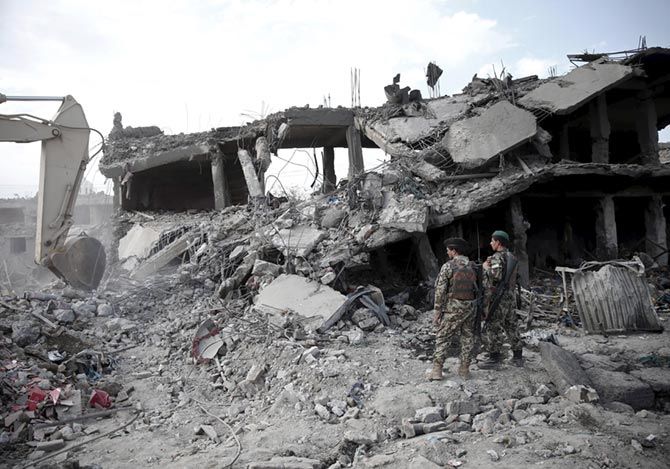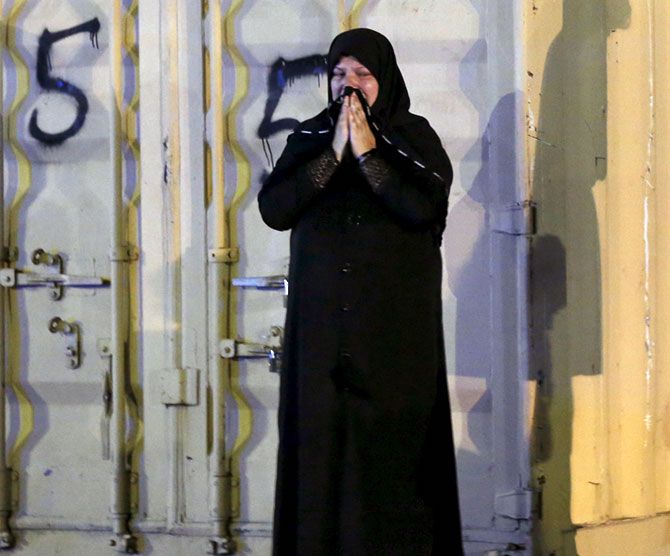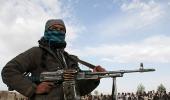'The ISI has given a stunning display of its capacity to do with impunity what it likes within Kabul. Incensed over the triumphalism of the hardliners in Kabul, the ISI has hit out; it is a typical ISI reflex action that Indians are familiar with,' says Ambassador M K Bhadrakumar.

There are many plausible explanations possible regarding the three deadly suicide bomb attacks in Kabul city last Friday, August 7:
- Taliban elements alienated from the new leadership of Mullah Akhtar Mansoor staged the attacks;
- The new Amir Mansoor himself might have asserted his leadership;
- Islamic State wanted to hoist the white flag on Kabul city centre; or,
- Vested interests unhappy with the incipient peace talks between the Afghan government and the Taliban decided to muddy the waters.
However, none of this actually holds water. The point is, the sheer scale of the attacks and their perfectly coordinated nature speaks by itself. There has been highly professional intelligence and logistics planning and back-up that went into the attacks.
Now, there is only one Afghan insurgent group that is capable of staging such a big-scale attack simultaneously at three strategic locations inside the capital city -- the Haqqani Network.
The impression becomes unavoidable that Pakistan's Inter-Services Intelligence, the ISI, masterminded the Kabul attacks, which were carried out by the Haqqani Network.
But then, why would the ISI do such a thing when the overall drift of the Afghan endgame has been favouring Pakistan?
Indeed, Pakistan's centrality in the endgame has been conceded by the big powers. Afghan President Ashraf Ghani has more or less conceded Pakistan's demands with regard to India's exclusion from the corridors of power in Kabul.
The Taliban's return to the Afghan government in some form or the other indeed seems a matter of time only. Pakistan has extracted cooperation from Kabul in its crackdown on the Pakistani Taliban and this has led to a marked improvement in Pakistan's internal security situation.
Above all, Pakistan is more happily placed on the diplomatic front than in a long while by brilliantly tapping into the US-China rivalry. Lord Curzon's prognosis of the unmatchable geography of Pakistan seems fully vindicated. Indeed, things couldn't have been better than what they have been lately.
That is, up until Kabul exposed the 'Mullah Omar myth' on that fateful day, July 30. By disclosing that a Taliban clique, with ISI backing, had usurped power within the Quetta Shura at least two years ago, Kabul shook up the entire edifice of Pakistan's Afghan policy.
It was a stunning blow to the ISI. Till today, Pakistan has not been able to offer an explanation as to why it perpetuated the 'Mullah Omar myth' for so long -- or, since when has the charade been going on.
Meanwhile, the regional stakeholders and the United States have quickly adjusted to the new reality and they are pinning hopes that the ISI's nominee, Mansoor, who succeeded as the new Taliban boss, would soon return to the peace talks.
Without doubt, the ISI keeps the new Taliban leadership on a tight leash. Mansoor lives mostly in Quetta and Karachi, has extensive business interests in Pakistan where he has amassed considerable wealth, thanks to ISI patronage.
His deputy Sirajuddin Haqqani too has a longstanding nexus with the ISI and the Haqqani Network's business acumen is also legion.
But where things have gone haywire is that the Taliban movement has been thrown into disarray once Kabul blew the whistle on Mullah Omar myth.
Of course, in the ultimate analysis, the ISI's long arm reaches deep inside Afghanistan and it is in a position to either squash or marginalise the dissent within the Taliban in a matter of time.
For the ISI, Mansoor's leadership is 'non-negotiable'. Although Mansoor has no achievements to show on the battlefield and lacks the charisma of his predecessor, he serves the purpose ideally for the ISI at this point in time as a rubber stamp in the Afghan endgame, because he is a worldly mullah and is an effective power broker within the Quetta Shura.
Nonetheless, Pakistan faces a serious dilemma as regards the timing of the next round of peace talks. The foreign policy and security policy advisor to the prime minister, Sartaj Aziz, has gently backtracked within the week.
Aziz's earlier optimism has evaporated and he now speaks of the second round of talks taking place 'before long once the leadership issue is decided because whom they represent it is not yet clear, whether there will be unanimity on the leadership or not.'
The 'leadership issue' provides the perfect alibi for Pakistan to parry on the peace talks. The heart of the matter is that the ISI and the military leadership in Rawalpindi are livid that the balance of forces has shifted in favour of Kabul.
Therefore, last Friday's strikes at the heart of Kabul city carry a grim message from the ISI to the Afghan government -- namely, that there is a price to pay for the hardliners in Kabul undercutting the Pakistani military's Afghan strategy.
The ISI has given a stunning display of its capacity to do with impunity what it likes within Kabul city itself. Incensed over the triumphalism of the hardliners in Kabul, the ISI has hit out; it is a typical ISI reflex action that Indians are familiar with.
Where do things go from here?
First and foremost, Pakistan will not allow the second round of peace talks to be held until the ISI retrieves the lost ground and makes sure that it can once again talk to Kabul from a position of strength.

Ghani's national address on Monday, August 10, all but signals his awareness of the factors at work. He has warned that the recent warming of relations with Pakistan could end unless the attacks ceased and peace talks resumed.
To be sure, Pakistan too would know that an indefinite postponement of the peace talks would be politically damaging for Ghani and it is unlikely that Pakistan would want to weaken Ghani.
Secondly, there is always the unease in the Pakistani mind that India might exploit Ghani's alienation.
Ghani's phone call to US Secretary of State John Kerry on Monday evening underscores the extreme fragility of his position today -- caught in the crossfire between the hardliners in Kabul on the one hand and the ISI and the Pakistani military on the other.
Significantly, on Sunday, August 9, the day before making his hard-hitting speech, Ghani spoke with Pakistani Prime Minister Nawaz Sharif and army chief General Raheel Sharif. It was decided that an Afghan delegation would travel to Pakistan on Thursday, August 13.
Ghani's speech was primarily addressed to the domestic audience, intended to ride the wave of the widespread anger among the Afghans over the attacks in Kabul. His angry tone regarding the Pakistani machinations will resonate in the Kabul bazaar.
Ghani warned Pakistan that a 'turning point' has come insofar as the violence must stop. Or else, Afghanistan will by itself pursue peace and reconciliation 'according to its own ways and mechanism.'
'We do not want Pakistan to bring the Taliban to peace talks,' Ghani said, 'but want Pakistan to stop activities on its soil of those who are waging the rebellion against Afghanistan.'
Ghani used exceptionally strong language, but, interestingly, the foreign office in Islamabad gave a muted response in a bid to calm his anger.
It wouldn't have escaped the attention of Islamabad that woven into Ghani's speech were hints regarding a way forward. One, Ghani underscored that 'peace with Pakistan and peace with the Taliban' are two sides of the same coin. The message is loud and clear.
Two, Ghani signaled that the dissipation of the Mullah Omar myth can be seized as 'a new window of opportunity (that) has opened' and it all depends on 'the capacity and the will of the Pakistani leadership to change the window into a door and then to an alley and even a highway, or shut it all together.'
Three, Ghani disclosed that the Afghan delegation proceeding to Pakistan on Thursday will follow up on a solemn assurance given to him by Prime Minister Sharif 'to direct his government to chart out an action plan against terrorism and to discuss and decide on its implementation.'
Ghani seems to visualise that the peace talks can still be rescued from the debris of the 'Mullah Omar myth' and the ISI attacks on Kabul on Friday, August 7.
The bottom line is that his best option will be to work toward putting the peace talks back on track. And that is also what Washington and Beijing will advise Ghani to do.
Ambassador M K Bhadrakumar is a retired diplomat, who is widely acknowledged as one of the most authoritative experts on Afghanistan. Mr Bhadrakumar blogs at https://blogs.rediff.com/mkbhadrakumar/











 © 2025
© 2025